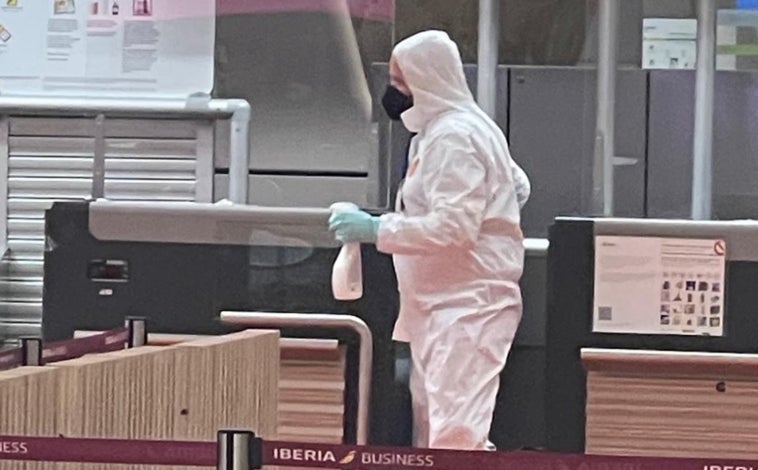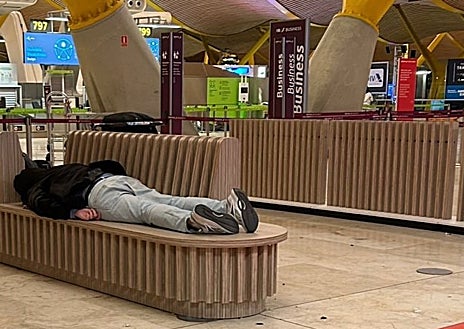A hostel in Terminal 4 of Barajas Airport: robberies, sex in restrooms, and bedbugs

For some people, an airport can be one of the most uncomfortable places, a place you only go because you have no other choice. This is what happens to the nearly 400 homeless people eking out a living at Adolfo Suárez Madrid-Barajas Airport, from where thousands of travelers and tourists take off or return home. Like those bad hosts who sweep the mess under the rug, the public company Aena has sent the beggars to the lower level, more discreetly visible to passengers, while blaming Madrid City Council for this entrenched shelter that grows by the week . The council is calling on the central government to roll up its sleeves and get to work: municipal resources are what they are and are at their limit, without the obligation to shelter hundreds of people under its roof because the Ministry of Transport turns a blind eye.
One against the other, and vice versa, while bedbugs, cockroaches, spiders, thefts, and even furtive sex in the public restrooms (the only cubicles without cameras at the airport) have employees on edge. This newspaper has learned that Aena has ordered a new fumigation of the facilities where the homeless are living, following union complaints. There are already workers with bites on their arms, for example. Pest control technicians already visited there at the end of April, although the Community of Madrid and Aena deny any infestation. This company, which manages Spanish airports, goes further and states that "it cannot be confirmed that this is the source," referring to the injuries reported by employees.
The Federal Police Union (UFP) believes that there is "a security problem, especially due to fights," in addition to cases occurring in which, upon being identified, officers discover that some of these individuals have judicial warrants, some kind of search for an outstanding matter. "They need a housing solution, not to be left lying there. About 300 or 400 people sleep there each night, although during the day there are far fewer," explains the union's general secretary, Serafín Giraldo.
The most tragic case occurred on March 20, when a homeless man was found dead outside a Terminal 4 cafeteria. At the beginning of their morning shift, around 8:00 a.m., National Police Citizen Security officers observed the man lying on the bar of La Bien Tirada. He was middle-aged, undocumented, and showed no signs of violence. He had been dead for four to three hours, and no one had noticed until then.
The police force agrees that it is not they who should respond to this problem, "but rather the public administrations." The officers assigned to the border crossing and the entire Adolfo Suárez-Madrid Barajas Airport "already have enough workload with the regular monitoring" of the base, without having to "deal with people who are overcrowded." They recall that they have already requested a solution from both the General Directorate of Police and the public entity Aena itself. The problem is also present, although less intensely, in Terminals 1 and 2, with approximately 80 personnel.
However, the Unified Police Union (SUP) is sending out "a message of calm and responsibility": "We want to clarify that no serious security incidents are occurring, beyond isolated situations such as the recent one, in which an individual threatened a security guard with a knife and was arrested," explains spokesperson Nadia Pajarón. She praises the "efficiency and professionalism" of the police officers "in ensuring the safety of all users." And regarding bedbugs, the SUP indicates that "the technical reports from the specialized disinfection company ruled out any such problem, so there is no confirmed health risk."



In terms of security, they insist, the situation is under control thanks to the "constant supervision of the National Police"; although they acknowledge that "the presence of homeless people at an international airport projects an image that should concern those responsible for social policies."
For its part, the Jupol union also believes that "it's not a police problem, nor even a public safety problem": "The commissioner in charge was concerned about the situation, and the homeless are registered. When legal complaints or prison orders arise, these people are brought before the courts. Sometimes there are fights, but these are isolated matters. It's more of a political issue and depends on Aena, on Minister Óscar Puente, not on the Ministry of the Interior," emphasizes its spokesperson, Ibón Domínguez.
A political arena where the difficult situation has once again sparked a backlash between Madrid City Council and the Ministry of Transport, just two months after the last clash . While the capital's mayor, José Luis Martínez-Almeida, initially urged the central government to "assume its responsibility, stop washing its hands, and address the solution now," Aena president Maurici Lucena announced on Friday afternoon that they will send a formal request to Cibeles "to comply with its legal obligations as a responsible public administration."
In a statement to the media at Aena headquarters, Lucena pointed out that the mayor's words call into question the spirit of collaboration with the City Council, criticizing it for its dereliction of duty. "It is absolutely unacceptable that Almeida's response is to pass the buck and say that social services are overwhelmed," she stated.
A vision diametrically opposed to that of Cibeles, whose leading exponent is clear that responsibility lies with the central government. "We are in constant contact with Aena, we are part of and agree to be part of a working group, but the Spanish government must assume its responsibility because here they cannot claim to be a private operator, as they do with Red Eléctrica. Aena is public, the government has control, and what is happening there depends on several ministries," Almeida insisted, not forgetting that Madrid's image is being severely damaged at the city's main international entry point.
Madrid City Council, José Fernández, the Delegate for Social Policies, Family, and Equality, recalled yesterday, has provided social assistance to 94 homeless people in April alone. "The question is how many people has the Spanish government assisted to date at Barajas Airport? That's why we have asked and will continue to ask for the involvement of four ministries that have not attended these four technical meetings," he stated.
Meanwhile, the problems are spreading, affecting not only the individual terminals but also some parking lots, such as the one at Terminal 4, where some employees report damage and petty theft of vehicles. One of those affected even realized his vehicle had been occupied when he noticed a used handkerchief on the floor mat and the passenger seat fully reclined. As if someone had slept there.
This problem was already reported some time ago, when the various union branches at Barajas Airport signed a statement in support of the workers. "It is more than common to find punctured tires, broken windows and mirrors, in addition to damage to the vehicle bodywork," the Workers' Assembly Committee stated, demanding that the airport director "remedy the attacks that have been occurring for several years."
ABC.es





